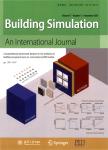End-to-end data-driven modeling framework for automated and trustworthy short-term building energy load forecasting
作者机构:Department of the Built EnvironmentEindhoven University of TechnologyEindhovenThe Netherlands Energy Efficient Cities InitiativeDepartment of EngineeringUniversity of CambridgeCambridgeUK Institute of Refrigeration and CryogenicsZhejiang UniversityHangzhouChina Institute of Green Building and Engineering DesignZhejiang Province Institute of Architectural Design and Research Co.Ltd.HangzhouChina Key Laboratory of Clean Energy and Carbon Neutrality of Zhejiang ProvinceJiaxing Research InstituteZhejiang UniversityJiaxingChina
出 版 物:《Building Simulation》 (建筑模拟(英文))
年 卷 期:2024年第17卷第8期
页 面:1419-1437页
核心收录:
学科分类:080702[工学-热能工程] 08[工学] 0807[工学-动力工程及工程热物理]
基 金:funded by the National Natural Science Foundation of China(No.52161135202) Hangzhou Key Scientific Research Plan Project(No.2023SZD0028)
主 题:building energy load forecasting end-to-end data-driven modeling automated machine learning Bayesian optimization model retraining model interpretation
摘 要:Conventional automated machine learning(AutoML)technologies fall short in preprocessing low-quality raw data and adapting to varying indoor and outdoor environments,leading to accuracy reduction in forecasting short-term building energy ***,their predictions are not transparent because of their black box ***,the building field currently lacks an AutoML framework capable of data quality enhancement,environment self-adaptation,and model *** address this research gap,an improved AutoML-based end-to-end data-driven modeling framework is *** optimization is applied by this framework to find an optimal data preprocessing process for quality improvement of raw *** bridges the gap where conventional AutoML technologies cannot automatically handle missing data and outliers.A sliding window-based model retraining strategy is utilized to achieve environment self-adaptation,contributing to the accuracy enhancement of AutoML ***,a local interpretable model-agnostic explanations-based approach is developed to interpret predictions made by the improved *** overcomes the poor interpretability of conventional AutoML *** performance of the improved framework in forecasting one-hour ahead cooling loads is evaluated using two-year operational data from a real *** is discovered that the accuracy of the improved framework increases by 4.24%–8.79%compared with four conventional frameworks for buildings with not only high-quality but also low-quality operational ***,it is demonstrated that the developed model interpretation approach can effectively explain the predictions of the improved *** improved framework offers a novel perspective on creating accurate and reliable AutoML frameworks tailored to building energy load prediction tasks and other similar tasks.



